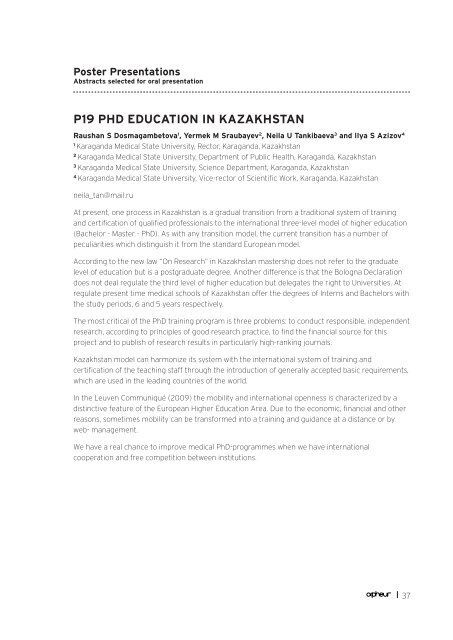PDF conference book - ORPHEUS
PDF conference book - ORPHEUS
PDF conference book - ORPHEUS
You also want an ePaper? Increase the reach of your titles
YUMPU automatically turns print PDFs into web optimized ePapers that Google loves.
Poster Presentations<br />
Abstracts selected for oral presentation<br />
P19 PHD EDUCATION IN KAZAKHSTAN<br />
Raushan S Dosmagambetova 1 , Yermek M Sraubayev 2 , Neila U Tankibaeva 3 and Ilya S Azizov 4<br />
1 Karaganda Medical State University, Rector, Karaganda, Kazakhstan<br />
2 Karaganda Medical State University, Department of Public Health, Karaganda, Kazakhstan<br />
3 Karaganda Medical State University, Science Department, Karaganda, Kazakhstan<br />
4 Karaganda Medical State University, Vice-rector of Scientific Work, Karaganda, Kazakhstan<br />
neila_tan@mail.ru<br />
At present, one process in Kazakhstan is a gradual transition from a traditional system of training<br />
and certification of qualified professionals to the international three-level model of higher education<br />
(Bachelor - Master - PhD). As with any transition model, the current transition has a number of<br />
peculiarities which distinguish it from the standard European model.<br />
According to the new law “On Research” in Kazakhstan mastership does not refer to the graduate<br />
level of education but is a postgraduate degree. Another difference is that the Bologna Declaration<br />
does not deal regulate the third level of higher education but delegates the right to Universities. At<br />
regulate present time medical schools of Kazakhstan offer the degrees of Interns and Bachelors with<br />
the study periods, 6 and 5 years respectively.<br />
The most critical of the PhD training program is three problems: to conduct responsible, independent<br />
research, according to principles of good research practice, to find the financial source for this<br />
project and to publish of research results in particularly high-ranking journals.<br />
Kazakhstan model can harmonize its system with the international system of training and<br />
certification of the teaching staff through the introduction of generally accepted basic requirements,<br />
which are used in the leading countries of the world.<br />
In the Leuven Communiqué (2009) the mobility and international openness is characterized by a<br />
distinctive feature of the European Higher Education Area. Due to the economic, financial and other<br />
reasons, sometimes mobility can be transformed into a training and guidance at a distance or by<br />
web- management.<br />
We have a real chance to improve medical PhD-programmes when we have international<br />
cooperation and free competition between institutions.<br />
37


